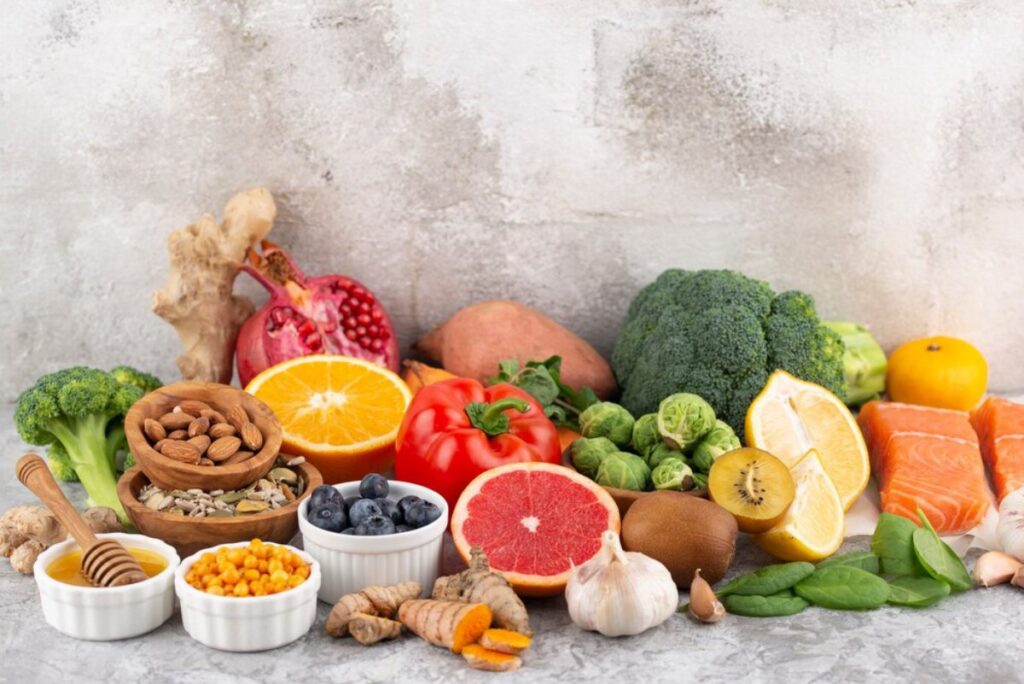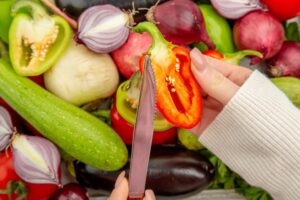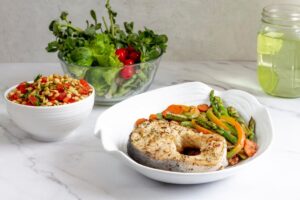The Health & Wellness Blog

Fruits and Vegetables with Anti-Inflammatory Properties: Nature’s Healing Power
The impact of chronic inflammation, associated with numerous routine health issues. It’s more crucial than ever to understand how diet can help control that inflammation. Inflammation is reduced by the consumption of anti-inflammatory fruits and vegetables. The following blog discusses these healthy foods and how they can improve your well-being.
Chronic inflammation can trigger conditions such as arthritis, heart disease and certain cancers. We need inflammation to protect us, but long-term inflammation is bad for us. Fortunately, nature can provide us with so many anti-inflammatory foods. Incorporating these fruits and vegetables into your diet, you can tap into their healing power for better health.
Key Benefits / Why It Matters
Understanding Inflammation and Its Impact
Inflammation is the body’s immune response to injury or infection. It helps protect and promotes healing. Short-term inflammation is beneficial, like swelling around a scrape or a fever from an infection. However, chronic inflammation is harmful. It happens when the body continues to release inflammatory chemicals even without injury. This ongoing inflammation can lead to several diseases, including:
- Arthritis causes joint pain and stiffness.
- Cardiovascular Diseases: Can harden and narrow arteries.
- Cancer: Linked to long-term inflammation in tissues.
Managing inflammation is crucial for overall health. One easy way to help is by adding anti-inflammatory foods, especially fruits and vegetables, to your diet.

The Role of Healthy Fruits
Fruits are well-known for their health benefits, and many have strong anti-inflammatory properties. They are packed with vitamins, minerals, and antioxidants that fight chronic inflammation. Here are some effective fruits:
Berries (Blueberries, Strawberries, Raspberries, Blackberries)
Berries are rich in anthocyanins, powerful antioxidants that lower inflammation markers. These antioxidants reduce oxidative stress and inhibit inflammatory molecules. Studies show that eating berries can decrease C-reactive protein (CRP), an inflammation marker.
- Blueberries: High in anthocyanins and vitamin C, both have anti-inflammatory effects.
- Strawberries: Contain ellagic acid, another strong antioxidant that reduces inflammation.
- Raspberries and Blackberries: Rich in fibre and quercetin, a flavonoid with anti-inflammatory benefits.
Citrus Fruits (Oranges, Lemons, Grapefruits)
Citrus fruits such as oranges, lemons, and grapefruits are rich in vitamin C. This vitamin is a potent antioxidant, so it helps lower inflammation. It protects tissues by neutralising free radicals. Citrus fruits also have flavonoids, especially hesperidin, which can inhibit inflammation.
- Oranges: Besides vitamin C, they contain limonene, which helps reduce inflammation.
- Lemons and Grapefruits: Both have citric acid, linked to lessening the inflammatory response.
Nutritious Vegetables and Their Benefits
Vegetables are key in an anti-inflammatory diet. They are full of vitamins, minerals, fiber, and phytochemicals. These nutrients nourish the body and help lower inflammation.
Leafy Greens (Spinach, Kale, Swiss Chard)
Leafy greens like spinach, kale, and swiss chard are very nutrient-dense. They are high in omega-3 fatty acids, known for their anti-inflammatory effects. Omega-3s lower pro-inflammatory molecules, reducing inflammation. Leafy greens also contain vitamin K, which is linked to lower inflammation markers.
- Spinach: It contains antioxidants like lutein and zeaxanthin, combating oxidative stress.
- Kale: Loaded with beta-carotene and vitamin C, strong anti-inflammatory agents.
- Swiss Chard: High in vitamin E, which neutralises free radicals and lowers inflammation.
Cruciferous Vegetables (Broccoli, Brussels Sprouts, Cauliflower)
Cruciferous vegetables like broccoli, Brussels sprouts, and cauliflower are rich in sulforaphane, a compound with strong anti-inflammatory properties. Sulforaphane boosts the body’s antioxidant defences and reduces inflammation markers.
- Broccoli: Contains vitamins C and K, plus fibre and folate, all fighting inflammation.
- Brussels Sprouts: High in vitamin C, folate, and antioxidants that reduce inflammation.
- Cauliflower: Packed with glucosinolates, which lower inflammation at the cellular level.
Root Vegetables (Sweet Potatoes, Carrots, Beets)
Root vegetables like sweet potatoes, carrots, and beets are high in beta-carotene, a vitamin A precursor that reduces inflammation. They also have antioxidants and fiber, lowering oxidative stress and supporting immune health.
- Sweet Potatoes: Rich in vitamin A, potassium, and fibre, they help regulate inflammation.
- Carrots: Full of beta-carotene and vitamin C, great for an anti-inflammatory diet.
- Beets: Contain betalains, antioxidants that reduce inflammation, especially in arthritis.

Real-Life Applications
Adding anti-inflammatory produce to your meals is simple and rewarding. Here are some easy ways to include these fruits and vegetables:
- Morning Smoothie: Blend berries, spinach, and a splash of citrus juice for a refreshing start to your day.
- Lunch Salad: Mix leafy greens like kale or spinach with cruciferous veggies like broccoli and Brussels sprouts. Add citrus segments, avocado, and olive oil for a nutrient-rich salad.
- Dinner Dish: Use root vegetables like sweet potatoes and carrots in roasted veggie dishes. Pair with lean protein like grilled chicken or fish for a balanced meal.
These small changes can significantly impact inflammation over time. With creativity, you can enjoy a variety of anti-inflammatory meals.
Additional Expert Tips & Common Mistakes to Avoid
Best Practices for Maximising Benefits
- Diversity is Key: Eating various fruits and vegetables ensures you get a wide range of nutrients to fight inflammation.
- Prioritise Freshness: Fresh produce often has more beneficial nutrients than processed options. Choose fresh, local fruits and vegetables when possible.
- Combine anti-inflammatory foods with healthy fats. Nuts, seeds, and olive oil are great choices. This pairing helps your body absorb fat-soluble vitamins and antioxidants.
Common Mistakes and Misconceptions
- Ignoring Portion Sizes: Healthy foods can add up. It’s key to balance portions to avoid extra calories, especially from higher-calorie foods like avocados and nuts.
- Ignoring Preparation Methods: How you cook fruits and vegetables can affect their nutrient content. Steaming, roasting, or lightly sautéing preserves anti-inflammatory properties better than frying.
- Neglecting Consistency: Eating anti-inflammatory foods now and then won’t help as much as adding them to your diet regularly. Include a variety with each meal for sustained benefits.
Advanced Insights / Expert Recommendations
The Science Behind Anti-Inflammatory Produce
Recent studies show how fruits and vegetables reduce inflammation. Polyphenols in plant foods can inhibit pro-inflammatory cytokine production. Plus, the fibre in produce helps maintain a healthy gut microbiome, crucial for regulating inflammation.

Unique Industry Perspectives
Nutritionists stress a balanced diet for overall health. Anti-inflammatory foods are good, but also eat whole grains, lean proteins, and healthy fats. This approach provides all the nutrients needed to function well and fight inflammation.
Lesser-Known Insights
Some fruits and veggies, such as papaya and ginger, have special compounds. These compounds provide extra anti-inflammatory benefits. Papaya contains papain, which helps digestion and reduces inflammation. Ginger has gingerol, a compound with strong anti-inflammatory effects that can enhance your diet.
Embrace Nature’s Healing Power
Fruits and vegetables that fight inflammation can help reduce swelling. Additionally, this can enhance your health naturally. And by knowing their benefits and making wise decisions, you can begin working toward a healthy lifestyle.
As with these healthy foods, consistency and variety are paramount. Begin including several anti-inflammatory foods in your meals each week and expand from there. You will experience less inflammation and a more vibrant, energetic life.
Ready to tap into nature’s healing power? Begin today by adding more anti-inflammatory foods to your diet. You’ll feel the benefits!









